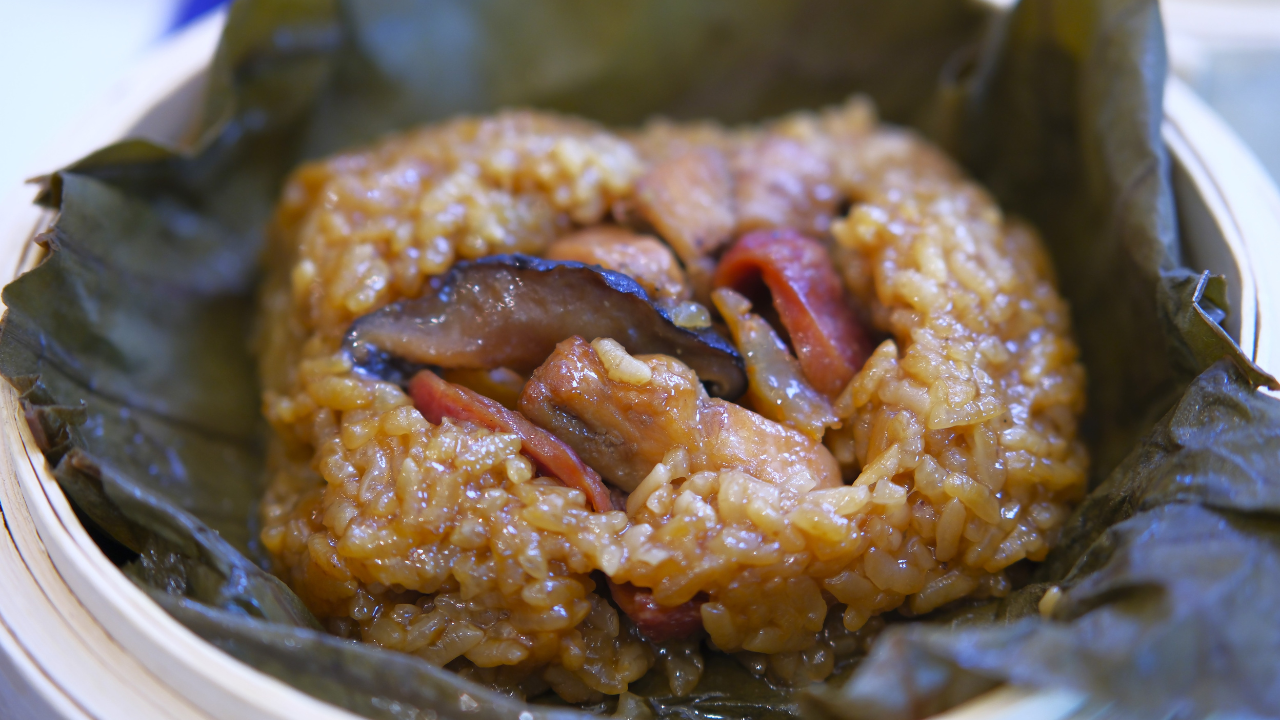Sticky Rice Lotus Leaf Wraps (Dim Sum Lo Mai Gai Recipe)
Rated 3.4 stars by 46 users
Author:
Souped Up Recipes
Servings
8
Prep Time
3 hours
Cook Time
1 hour
Lo Mai means glutinous rice in Cantonese, and Gai means chicken. This dish is also known as "sticky rice with chicken in lotus leaf wrap." It is a classic breakfast item that you can grab from street vendors while heading to school or work. It is also served as a dim sum dish in tea house restaurants which was one of my favorite places to go on a weekend morning when I lived in China. I will be honest, this is a challenging recipe, but it is so delicious that worth trying.

Ingredients
- 560g / 2.5 cups of glutinous rice
- 25g / 8 pieces of dried shiitake mushroom
- 30g / ¼ cup of dried shrimp
-
4 whole lotus leaves, cut in halves
- 300g / 2 pieces of boneless and skinless chicken thigh
- 1.5 tbsp of oyster sauce
- 2.5 tbsp of soy sauce
- White pepper to taste
- 2 tsp of dark soy sauce
- 80g / 2 pieces of Cantonese sausage
- 2 tbsp Oil to stir fry the chicken
- 1 tbsp of minced garlic
- 1 ⅓ cups of mushroom and shrimp soaking liquid
- 2 tbsp of Chinese cooking wine
- salt to taste
- 510g / 2 cups + ¼ cup of water to cook the rice
Directions
Prepping Before Cooking
- Rinse and rub the glutinous rice to remove the excess starch, then discard the liquid. Do this several times until the water becomes clear. Soak the rice for at least 3 hours.
- Soak the dried shitake mushrooms with 1 cup of water; soak the dried shrimp with 1/3 cup of water. Please measure the water for the mushroom and dried shrimp precisely as we will use the soaking liquid later.
- Soak the lotus leaves for 2 hours or until they are soft and pliable. The leaves are big; you may have to fold them and use something heavy to press them down under the water.
- Cut the chicken thighs into bite-size pieces. Lo mai gai is traditionally made with chicken, but you can use pork and beef if you prefer.
- Marinade the chicken with oyster sauce, soy sauce, dark soy sauce, and white pepper for 2 hours. The amount of sodium in the chicken marinade may look heavy; don't worry, because later, we will cook the chicken with the soaking liquid so it won't taste salty.
- After 2 hours, squeeze the mushroom, and slice them thinly; Drain the shrimp and finely mince them. Combine both soaking liquids and reserve on the side.
- Slice Cantonese sausage into thin pieces with 45-degree angle.
Pre-cook the Sausage, Shrimp, Mushroom, and Chicken
- Heat the wok and saute the sausage without oil over medium heat until slightly translucent. Add the minced shrimp and stir until you can smell the shrimpy umami flavor. Remove both ingredients from the wok and set them aside.
- Heat the wok until smoking hot and oil to the same wok. Toss in the marinated chicken and stir for a couple of minutes or until the chicken changes color.
- Add the mushroom slices and minced garlic and sauté for a couple of minutes.
- Pour the soaking liquid into the wok along with 2 tbsp of Chinese cooking wine and simmer the chicken for a few minutes.
- Taste the soupy sauce and add some salt to adjust the flavor. It should be a little saltier than your preference because we will mix it with the glutinous rice later.
- Use a strainer to take the chicken and the mushroom out, leaving the soup behind.
Pre-cook the Glutinous Rice
- If you have a rice cooker, add the glutinous rice and water to the rice cooker pot. Press the cook button and wait until done, which takes 15-20 minutes, depending on your appliance's wattage. If you don't have a rice cooker, below are the steps to cook the glutinous rice over the stove.
- Drain the glutinous rice and add it to a pot with 2 cups +1/4 cup of water.
- Put on the lid and bring the pot to a simmer over medium heat, which will take 3-6 minutes, depending on your stove. Do not go away because you have to turn the heat to the lowest as soon as the pot comes to a simmer. If you forget, the rice will overflow, and the bottom will start burning.
- Let the glutinous rice cook over low heat for 8-10 minutes or until you don't see any bubbling reaction in the pot. Turn off the heat, and you should have some perfectly cooked glutinous rice.
Wrap the Lo Mai Gai and Steam
- Thoroughly combine the glutinous rice with the reserved soup from cooking the chicken and mushroom; This will guarantee your Lo Mai Gai will come out extra flavorful, gooey, and soft.
- Use a pair of kitchen sears to cut the stem of the lotus leaf, then cut each leaf in half.
- To wrap the lo mai gai, use 1/3 cup of the glutinous rice to form a rectangle bed on the lotus leaf. Then I add the chicken, mushroom, sausage, and shrimp on top of the rice bed. Cover them with another layer of rice.
- Lift up one side of the leave and fold it over the rice. Tuck it tight, then fold two sides to the middle. Roll over the rest of the leaf like making an envelope. Sometimes lotus leaves will have some small cracks, but as long as it is not too serious, it should be fine.
- Repeat the steps to wrap the rest of of the lo mai gai.
- Put all the lo mai gai in a steamer and bring the water to a boil. Steam them over high heat for 30 minutes. The filling and the rice are cooked so the steaming process just lets the Lo Mai Gai infuse with the unique lotus leaf aroma.
Recipe Video
Recipe Note
- Cantonese sausage, also known as lap cheong (腊肠). They look like the skinny version of pepperonis, but the taste is quite different - slightly sweet and savory. Also, you cannot eat Cantonese sausage raw. It has to be cooked for safety purposes. If you can not find it, you can use another type of sausage, or you can check out myCantonese sausage recipes to make your own.
- Dried shrimp andshitake mushrooms are sundried and have complex tastes and aromas compared to fresh ones. If you use fresh shrimp and mushrooms, the dish will come out with a completely different taste. Also, here is a demo ofhow to dehydrate your own shrimp and mushrooms.
- Lotus leaves have a wonderful fragrance that adds authenticity to the Lo Mai Gai. If you don't have it, you can use banana leaves, bamboo leaves, or corn husks as an alternative. The aroma is going to be different but the taste will remain delicious.


























































